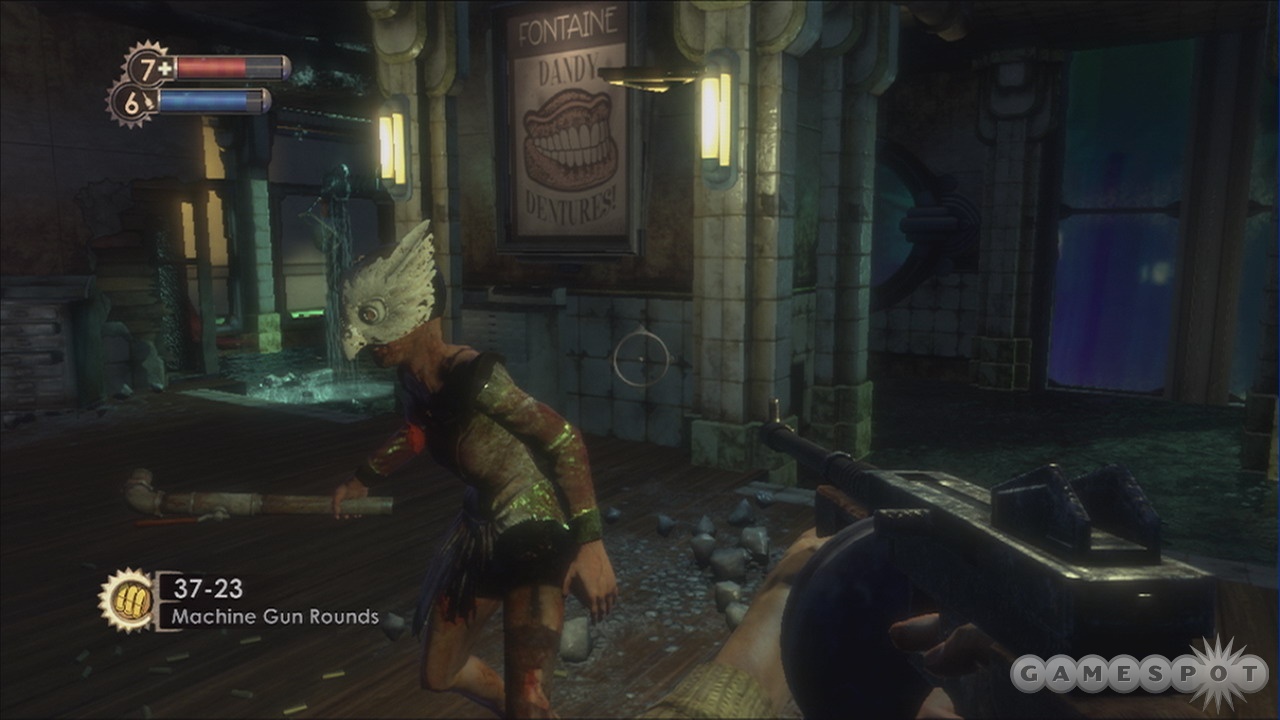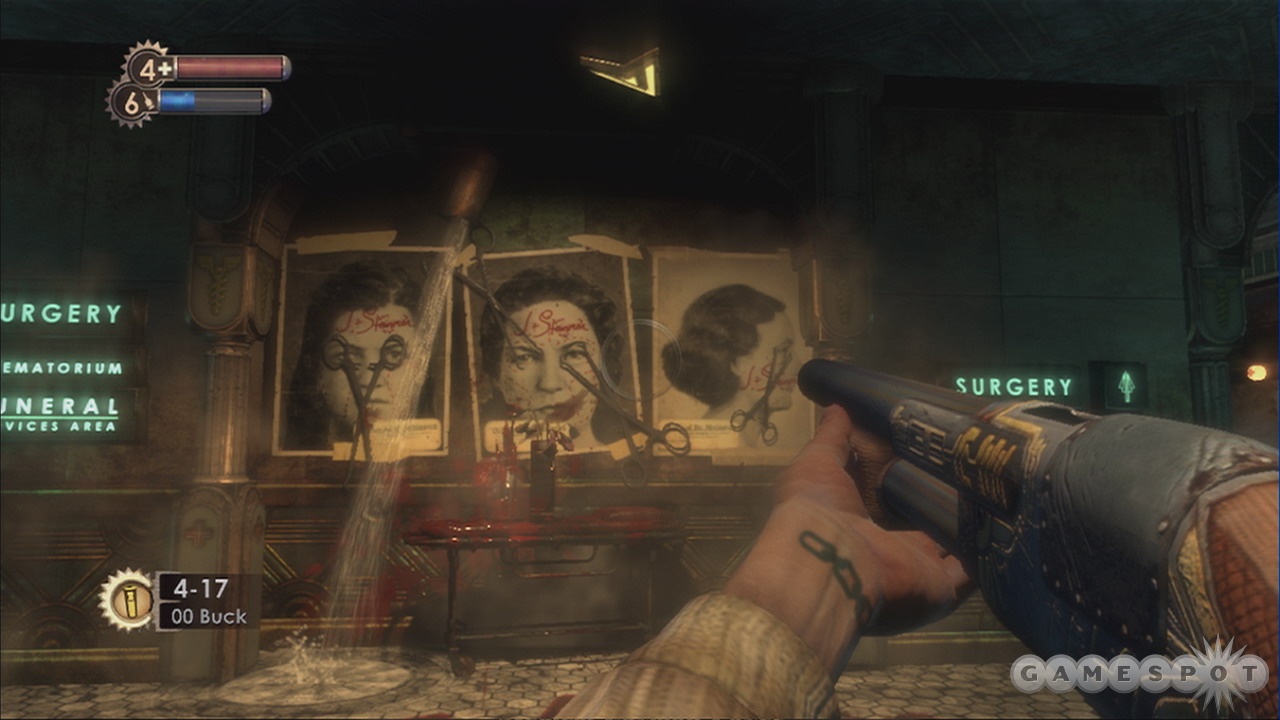When BioShock was released for the Xbox 360 and PC last year, it redefined what people could expect from a console first-person shooter. The intricately designed Rapture--a utopian city that had fallen on hard times--was the star of the show. This startlingly real metropolis located far below the ocean's surface was a planned community for people desperate to escape the imminent war on land, though a much worse fate caught up with those who made the move. One year later, PlayStation 3 owners finally get a chance to lay waste to the genetic freaks populating this dilapidated world. If you've already played through the original release, this version is nearly identical; the inclusion of a harder difficulty mode is not enough to lure BioShock veterans back to Rapture. However, if you missed BioShock the first time, you won't want to pass up this undersea adventure again.

The impressive graphics and gorgeous water effects make the transition to the PlayStation 3 intact. Rapture feels alive even in its decaying state. There are a number of unique environments located in this underwater city. The medical bay has pools of blood still drying on the floor and posters along the walls depicting surgical procedures; the clubs and bars have ads for various beers and places for people meeting for a drink to sit and relax; there are even forests in Rapture, with trees to provide the necessary oxygen for underwater living. The frame rate stays high no matter how many enemies and explosions are onscreen at one time. After a brief install when you first start the game, load times are kept to a minimum. The only loading screens you'll encounter are when you travel from one section to another using a bathysphere, but this is rare enough that it never breaks up the pace of the action.
As technically sound and artistically impressive as BioShock is, the reason to play the game is to experience the dark story of Rapture's downfall. The story is primarily told through audio recorders you'll find throughout the environment. These snippets document the growing madness taking place. When you come to the medical bay, you'll be introduced to a plastic surgeon who was obsessed with beauty. The recordings--both from him and those who observed him--tell of his haunting practices, how the freedom to run his facility without moral responsibility allowed him to create the human masterpieces he always envisioned. The people you'll come across are clearly mad with power, as you quickly discover, because nearly all of them have tampered with genetic modifications to their own bodies. Yet their motivations feel terrifyingly real.
Things get even more interesting when you're able to inject your own morality into the experience. During the course of your journey, you'll come across Little Sisters. These small girls control Adam, the life source that allows you to change your own genetics, giving you superhuman powers. You are able to see how power has corrupted the citizens of Rapture, but how will you react when presented with power for yourself? The Little Sisters are protected by Big Daddies, huge beings with limitless ammunition and an aggressive attitude. Once you dispose of these terrifying bodyguards, you'll be face to face with a defenseless Little Sister. They cry because they are scared, because their protector has been slain in front of their eyes, but they won't try to run away or attack you. You have to decide if you want to harvest them, sucking the Adam from their tiny bodies, killing them in the process. Of you can free them from their genetic prison, taking away just enough Adam to allow them to live normal lives. Seeing them try to break free from your grip is a heart-wrenching experience, and you'll have to decide for yourself if the extra Adam is worth it.

Even though BioShock is a slow-paced shooter, the action is just as satisfying as it was on the Xbox 360 and PC. You'll spend as much time listening to recordings and marveling at the environment as you will shooting enemies. But the gunplay is rather intense when enemies are swarming. You have a few standard weapons in your arsenal--a pistol, shotgun, machine gun, rocket launcher, and a wrench for close combat, yet these can be upgraded with parts you scavenge along the way. However, the game’s defining feature is its plasmids. These are the genetic modifications you unlock with precious Adam. You can shoot fire or bees from your hands, discharge an electric blast when attacked, or give yourself super healing abilities, and that's just the beginning. The action is able to stay intense throughout because you're constantly upgrading and changing your attacks. One of the big criticisms of the first release was that it was too easy. The PS3 version addresses this complaint by adding a punishing new difficulty setting and lets you choose not to use vita-chambers, life vaults that let you continue close to where you died.
The PlayStation 3 version of BioShock is every bit as engaging as the Xbox 360 and PC versions released last year. The graphics and gameplay are nearly identical across the platforms, so there is little reason to choose this latest release over the other versions. However, this game should be experienced no matter which system is your favorite. The story in BioShock is dark and satisfying, something that will make you contemplate it long after you've put the game down. And though combat takes a back seat to the enthralling atmosphere, it's still extremely satisfying to combine your plasmid powers with traditional weapons. The lack of any meaningful new content is disappointing, but this is still one of the finest first-person shooters around and a game that simply should not be missed.